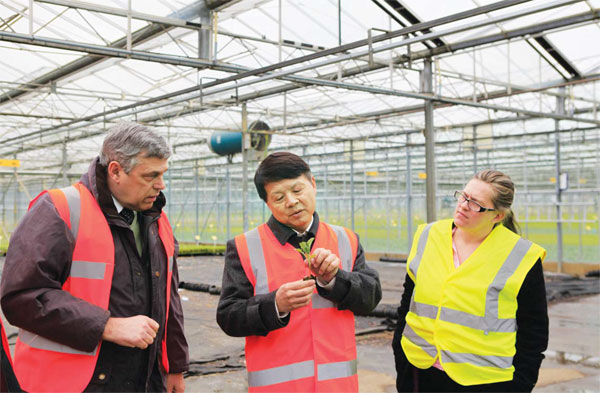The potato as an emblem of inefficiency
Updated: 2014-05-02 07:50
By Cecily Liu (China Daily Europe)
|
|||||||||||
|
Phillip Bosworth, export sales manager of Standen (left) and Claire Urry of China-Britain Business Council (right) showing minister counselor of the Chinese embassy in the UK Zhou Xiaoming planting techniques inside a greenhouse at Fountain Vegetable Plants, a UK company. Cecily Liu / China Daily |
Chinese agriculture is way behind with technology, and British firms think they have the tools to help
British agricultural equipment and technology companies are increasingly looking to China as the country's farms start to mechanize to increase productivity.
Such business opportunities did not exist a decade ago, but Chinese farmers' growing wealth and the country's urbanization has meant farming techniques and tools for major agricultural projects are now increasingly required.
"China is experiencing what Britain went through in the 1970s," says Bryan Ollier, managing director of Home Farm Trading, an agriculture consultancy. "The number of farms is decreasing and each one is becoming more efficient. Labor costs are also increasing, so mechanization is the way forward."
Britain's potato farming is an example. The country had about 36,000 potato farmers in 1963, but now has only about 4,000, of whom 800 account for 80 percent of total production. The farms now are much larger and more profitable, but advanced tools are used in lieu of expensive manual labor.
"Back then, supermarkets came into existence and instead of, say, farmers selling five tons of potatoes each day they sold 50 tons," Ollier says. "Farmers were under pressure to produce more, and as production increased some small farms could not sustain themselves financially, so the number of farms reduced, and mechanization became common."
One company keen to break into the Chinese market is Standen, which sold a potato-planting tool to a company in Shanxi two years ago.
Known as a quad planter, the machine takes out rocks in the soil before planting potatoes, so it allows the potatoes to grow in equal sizes and regular shapes, which are more suitable for the needs of consumers, who find regular potatoes easier to peel.
Phillip Bosworth, export sales manager for Standen, says generally potatoes will grow in irregular shapes when they grow against rocks, but if the rocks are removed, they can grow to their natural size. This increases the amount of potato content produced in the same amount of farm space.
The Shanxi company first saw the quad planter at Agritechnica, a farming sector trade fair in Germany, and bought the machine from Standen's German distributor. The company has now used the planter for two years and returned to Standen for another order.
China is now the world's biggest producer of potatoes, and with India accounts for a third of global production. But China's ability to plant, store and process potatoes is poor.
After observing the amount of waste China's potato sector produces, Bosworth is confident that Britain's potato planting and storage technology and know-how can greatly improve potato farming in China.
Bosworth's words are echoed by Nigel Kerby, managing director of Mylnefield Research Services Ltd, who says China's potato waste occurs in planting, growing, harvesting and storage, and such waste can be greatly reduced by using technology.
MRS, a commercial affiliate of the UK-based James Hutton Institute, has teamed up in recent years with the Chinese Academy of Agricultural Sciences to develop a new species of potato for the Chinese market that could greatly help the country increase its yields.
Currently potato yields in China are 15 tons a hectare, a third of what they are in Britain, Kerby says.
The two organizations developed a better-yielding potato seed that was tested in Sichuan, Hubei and Heilongjiang provinces over the past two years to make sure it grows well in China, he says. The new potato species is named Sulan One; its genetic makeup was developed in Scotland.
Kerby says the two groups are now registering the new species in China, which will give it a license to sell potato seeds to the local market on a large scale.
Martin Lishman is another agricultural technology company keen to break into China's market. The company's main products are compost tea systems, a crop-monitoring system and various potato quality monitoring equipment.
TuberLog, part of the company's potato quality monitoring equipment, is already used by PepsiCo in China to monitor the quality of potatoes on Chinese farms that are subsequently made into French fries for fast-food chains.
Shaped like a potato, the TuberLog is put into the potato harvesting system to detect possible places where potatoes can be bruised, as this information can be used to alter the harvesting process and minimize bruising.
Gavin Lishman, second-generation managing director of the family business, says potatos rotting as a result of bruising account for 30 percent of potato waste globally. The TuberLog would help many Chinese potato growers, particularly large ones, he says.
Lishman says he is also keen to sell many of the company's other products to China to take advantage of China's rapid agricultural mechanization. Lishman first visited China in 1995, but at the time he found the scope for business partnerships limited as many of his company's technological products were too advanced for Chinese farmers.
"Back then, our team worked with the Peking University testing some products on a farm in Jiangsu," Lishman says. "There was lots of understanding and appreciation, but we were very much ahead of what they were doing."
Lishman says his team hopes its products can now help Chinese farmers.
Another company keen to sell in China is Garford Farm Machinery, which specializes in sustainable mechanical weeding systems. Instead of using chemicals to kill pests, farmers can use Garford's Robocrop machines, which uproot weeds.
The interest in the Chinese market among British agricultural tool companies is representative of a wider global trend of collaboration between Chinese and Western companies on agricultural mechanization.
In 2002 Shanghai Tractor and Internal Combustion Engine Corporation formed a joint venture with CNH, the Italian-American multinational manufacturer of agricultural equipment. Today, it is one of China's largest joint ventures for agricultural machinery.
Despite obvious opportunities, challenges still exist for many British agricultural tool companies breaking into the Chinese market, and a primary concern is the high cost of the advanced machines. In addition, as most Chinese farmers have small plots, they often do not see the benefits of mechanization.
Ollier says he believes Western agricultural equipment companies hoping to sell their wares need to sell products that are smaller, hence more suitable for the market.
"They may need to take the manufacturing of such equipment elsewhere where costs are lower, as long as they keep the intellectual property," Ollier says.
Zhou Xiaoming, minister counselor of the Chinese embassy in London, also believes many British farming machinery products have potential in China.
Last month Zhou visited some British agricultural equipment companies to study the possibilities of helping them find opportunities in China, and was greatly impressed by the firms.
"Many British agricultural machinery companies are highly innovative and very efficient in their research and development work. Many of them don't employ a lot of workers, but the products they create are extraordinary."
Garford's Robocrop weeder is great for growing organic vegetables in China, as food safety concerns have made many middle-class Chinese consumers particularly conscious of food quality, he says.
"In China, many consumers are willing to pay quite a premium for organically grown vegetables, and the Robocrop would be a great tool for organic vegetable planting."
Zhou also believes many British companies lack capital and the market for large commercialization of agricultural technology, but China does have these.
It may be a good idea for some British companies to allow Chinese investors to participate as equity partners who can then help take technology to China and adjust it to suit local needs, he says.
"For this type of cooperation, finding the right partner is the key."
cecily.liu@chinadaily.com.cn
(China Daily European Weekly 05/02/2014 page19)
Today's Top News
Swiss move to reveal bank accounts will help China
Chinese police to patrol in Paris
Beijing rebuffs Hanoi's oil rig claims
Key Sino-Nigerian deals signed
EU: No armed intervention in Ukraine
Chinese premier visits Nigeria
Court to rule on Yingluck in Thailand
Travellers to Malaysia drop
Hot Topics
Lunar probe , China growth forecasts, Emission rules get tougher, China seen through 'colored lens', International board,
Editor's Picks

|

|

|

|

|

|






